
AP Photo/John Locher
Supporters raise a flag outside of the federal courthouse Monday, April 24, 2017, in Las Vegas. A jury found two men guilty of federal charges Monday in an armed standoff that stopped federal agents from rounding up cattle near Cliven Bundy’s Nevada ranch in 2014. Jurors said they were deadlocked on charges against four other men, and the judge told them to keep deliberating.
Published Tuesday, Aug. 15, 2017 | 4:58 p.m.
Updated Tuesday, Aug. 15, 2017 | 6:35 p.m.
In a dramatic end to a contentious trial, defense attorneys declined Tuesday to make closing arguments on behalf of four men accused of wielding assault weapons against federal agents in a 2014 standoff near Nevada anti-government figure Cliven Bundy's ranch.
The move left defendants Eric Parker, Steven Stewart and Ricky Lovelien of Montana and Oklahoma essentially mute in answer to 10 felony charges including conspiracy, weapon possession and assault on a federal officer.
Defendant Scott Drexler of Idaho testified in his defense on Monday.
Parker testified last week, but Chief U.S. District Judge Gloria Navarro ordered him off the witness stand and struck his testimony from the record for what she said was a deliberate failure to keep his testimony within bounds of rules she set to keep the focus on what the defendants saw and did during the confrontation, not what they felt or why they acted.
The judge said Monday she thought Parker tried to improperly invite jury nullification of charges.
Navarro also rejected testimony from five other prospective defense witnesses after hearing previews of what four planned to say and reviewing previous testimony from the fifth.
Acting U.S. Attorney Steven Myhre was left Tuesday with nothing to rebut, so he abandoned his plan to have the last word before the jury of eight women and eight men began deliberations.
The panel heard five weeks of prosecution testimony. They resume deliberations on Wednesday. Each defendant could face decades in prison if convicted.
Myhre and attorneys for Drexler, Parker and Stewart, all of Idaho, each declined outside court to comment.
Attorney Shawn Perez, representing Ricky Lovelien of Montana and Oklahoma, said he didn't think the government proved its case, so he felt no closing argument was needed.
Defense teams balking at summarizing their cases echoed the refusal in April 2016 of two of Bundy's adult sons and three other defendants to enter pleas following their arrests in the case. They said they didn't recognize authority of the government to prosecute them. A magistrate judge entered not-guilty pleas for them.
A first trial for the four current defendants ended with a hung jury in April. That jury found two other defendants guilty of some charges.
The jury on Tuesday heard a three-hour recitation by prosecutor Nadia Ahmed of the charges, retrial evidence and instructions from the judge.
Ahmed relied heavily on photos and videos showing each defendant carrying an assault-style weapon during the protest to stop a roundup of Bundy family cattle from public rangeland in a vast Gold Butte area that has since been made a national monument.
One photo showed the four men standing in a row atop a freeway overpass next to a sign declaring the West had been won.
Parker and Drexler were each photographed earlier, prone on the pavement of the Interstate 15 overpass, sighting their rifles through seams in a concrete roadside barrier toward the federal agents in a dry riverbed below.
"They did it. They helped each other do it. They agreed with each other to do it," Ahmed said, accusing the defendants of conspiring with Cliven Bundy, his sons and other alleged organizers to thwart agents' efforts to carry out lawful federal court orders.
Proving conspiracy is crucial for prosecutors ahead of a next trial, expected later this year, for the Bundy family patriarch, his two eldest sons and two other defendants. They each face 15 charges.
Six other defendants, including two other Bundy sons, are slated for trial next year.
Cliven Bundy says he doesn't recognize federal authority over public lands — a position with roots in the anti-government Sagebrush Rebellion 40 years ago. Ranchers and supporters called then for state and local control of vast tracts of federally owned land in the West.
